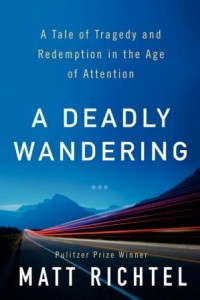 Raise your hand if you’ve ever texted while driving.
Raise your hand if you’ve ever texted while driving.
Raises hand.
I’ve made a concentrated effort to not use my phone while I’m driving, but it still happens.
A DEADLY WANDERING is a book that explores the science behind attention and distraction – specifically, how modern technology is distracting us more than ever before. In doing so, Richtel weaves together a real story about a 19-year-old boy, Reggie, who killed two men in September 2006 because he was texting and driving.
At this time, there were no laws against texting while driving. This technology was so new at the time that there wasn’t enough evidence to support a law (though there had been a number of fatal accidents due to people texting and driving), and many opponents thought a ban like this would be hard to regulate.
My favorite part of the book was learning about Reggie and everything that led up to his conviction. It was hard not to feel empathy for him, for all that he went through, even if he was in the wrong. I’ve been a distracted driver before and I even got into a fender bender a few years ago because I was answering a text and accidentally hit the car in front of me. (Luckily, we were stopped already and the light had turned green, so I eased up on the brake, looked down at my phone for a split second, and hit the car in front of me. Luckily again, no damage was incurred for either car but it was a freaking scary moment and I felt so dumb for causing this because I was on my phone.)
I thought I would really be interested in the neuroscience parts of the book – learning about the brain and attention span and how modern technology is affecting both. But my eyes glazed over during those sections and I found myself just skimming them. It just seemed like a regurgitation of facts and studies, but it was hard to connect that with the wider storyline. Honestly, I would have preferred if the book had cut those portions out completely and just focused on telling Reggie’s story and the impact distracted driving can have.
I also found that the book was a little too wordy in parts. It seemed like every person introduced – from Reggie to the wives of the men who were killed to the victims advocate Terryl to the prosecutor to the defense attorney – had a back story that we had to be introduced to before delving into the meat of why they were introduced. Even some of the pioneers of the research Richtel cited were given a back story before being introduced to their importance. I think a lot of that could have been cut out to make the story more concise and impactful.
All in all, though, a powerful book that tells an important message about distracted driving, modern technology, and the way our attention span can shift in an instant.
Book synopsis (from Goodreads):
From Pulitzer Prize–winning journalist Matt Richtel, this is a brilliant, narrative-driven exploration of technology’s vast influence on the human mind and society, dramatically told through the lens of a tragic “texting-while-driving” car crash that claimed the lives of two rocket scientists in 2006.
In this ambitious, compelling, and beautifully written book, Richtel examines the impact of technology on our lives through the story of Utah college student Reggie Shaw, who killed two scientists while texting and driving. Richtel follows Reggie through the tragedy, the police investigation, his prosecution, and ultimately his redemption.
In the wake of his experience, Reggie has become a leading advocate against “distracted driving.” Richtel interweaves Reggie’s story with cutting-edge scientific findings regarding human attention and the impact of technology on our brains, proposing solid, practical, and actionable solutions to help manage this crisis individually and as a society.
A propulsive read filled with fascinating, accessible detail, riveting narrative tension, and emotional depth, A Deadly Wandering explores one of the biggest questions of our time–what is all of our technology doing to us?–and provides unsettling and important answers and information we all need.
You can connect with Matt Richtel on his website. His book is available to buy from Amazon, IndieBound, and Barnes & Noble.
Click here to add this book to Goodreads!
I received this book for free from TLC Book Tours in exchange for an honest review. All words and opinions, unless otherwise stated, are my own.
No affiliate links were used in this post.
We have lots of texting while driving laws now and I’m so thankful for that! I definitely do NOT text when I’m driving and I’m also hesitant to check my phone at stop lights. i’ve become very paranoid about things like that. I don’t think I’d do well with the neuroscience part either… not my thing!
I’m hypersensitive with distracted drivers now. My husband was killed by someone changing the radio station. I can’t even ride with someone who’s talking on a speakerphone. If you can, please don’t text and drive.
I’ve just been talking recently with friends about our lack of focus as a society, and this book is an excellent example of the ease with with are distracted, to our serious detriment.
Thanks for being a part of the tour!